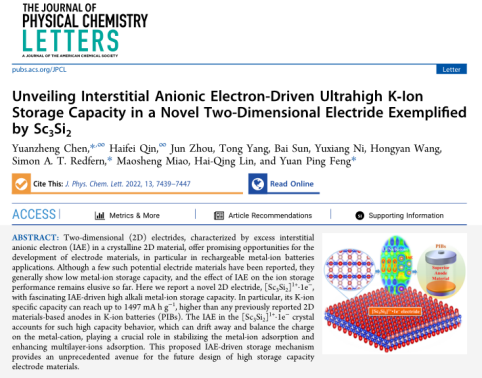Important progress has been made in the research of high energy storage batteries by the Nanomaterials and Computational Physics Team of the School of Physical Science and Technology at Southwest Jiaotong University. Recently, Associate Professor Chen Yuanzheng of the team, together with Professor Simon A. T. Redfern from Nanyang Technological University and Professor Feng Yuanping from National University of Singapore, made important progress in the research of high energy density metal ion batteries and their energy storage mechanisms. The research results, titled "Unveiling Interstitial Anionic Electron-Driven Ultrahigh K-Ion Storage Capacity in a Novel Two-Dimensional Electride Exemplified by Sc3Si2," were published in the internationally renowned journal J. Phys. Chem. Lett. on August 6, 2022 (IF=6.888, Tier 1, https://pubs.acs.org/doi/full/10.1021/acs.jpclett.2c01888). They were also featured in the official media column of the Journal of Physical Chemistry as a hot topic.

Battery energy storage technology is one of the core technologies for developing clean energy and realizing a national intelligent power grid. It is also a key support for the optimization of the national energy structure. However, the current mature lithium-ion battery energy storage technology is too expensive due to the low natural resources of lithium and their uneven distribution, making it unable to meet the large-scale energy storage needs of modern industrial development. Potassium-ion batteries, as a new type of "post-lithium-ion battery," are considered to be high-performance secondary batteries that can replace lithium-ion batteries due to their rich and widely distributed potassium resources. However, the current electrode materials suitable for potassium-ion batteries are relatively few and have generally low energy storage capacity. This is a key scientific problem that restricts the large-scale industrialization of potassium-ion batteries and is a hot topic in current international frontier research and interdisciplinary focus.
This research work was supported by the National Natural Science Foundation of China (12164009), the Postdoctoral Science Foundation (2021M690325), the Science and Technology Department Fund of Sichuan Province (2020JY0314, 2021YFG0228), and the Academic Research Fund of the Ministry of Education of Singapore (R-144-000-441-114).





